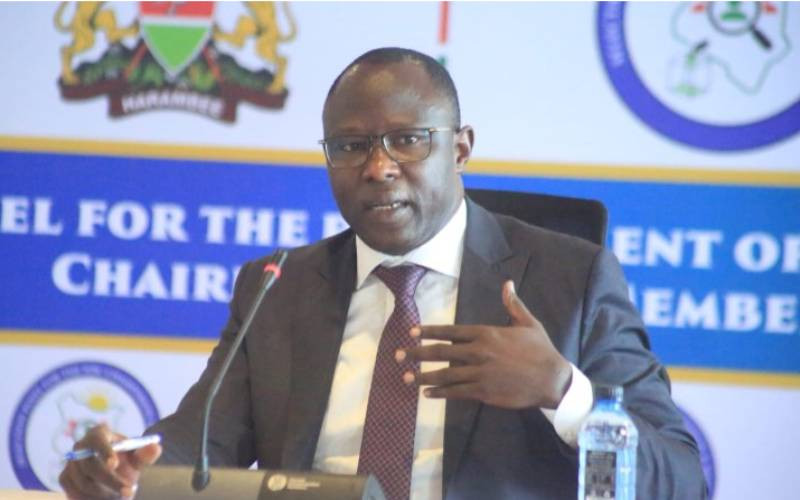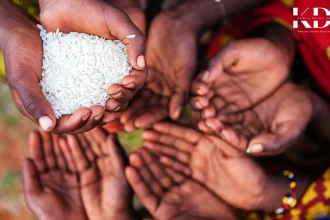As Kenyans await the vetting of the Independent Electoral and Boundaries Commission nominees, a packed in-tray awaits the new Commissioners at Anniversary Towers.
The commissioners recently nominated after a year-long vacancy, the commission faces a bulging in-tray of urgent tasks, from boundary delimitation to voter registration, amid concerns over independence and public trust.
A Commission Under Scrutiny
The IEBC has been without commissioners since the 2022 presidential election, which saw disputes over the results and allegations of electoral mismanagement.
President William Ruto’s recent naming of new nominees, including the chairperson and members, has stirred debate even as Parliament prepares to kick off the vetting on May 27.
Critics have raised concerns about potential state interference in the selection process, warning that a lack of independence could undermine free and fair elections.
A TIFA recent poll revealed that 55 per cent of Kenyans doubt the merit of the selection, with allegations of nepotism and favoritism clouding the process.
The new commission, once confirmed, must hit the ground running to restore public confidence even as it tackles the packed in-tray.
The IEBC’s credibility is paramount, given Kenya’s history of post-election violence in 2013, 2017, and contentious disputes in 2022, where the Supreme Court accused the commission of “bungling” the presidential election.
Ensuring transparency and impartiality will be the first test for the reconstituted body.
Boundary Delimitation
One of the IEBC’s most pressing tasks is the review and delimitation of electoral boundaries, a constitutionally mandated exercise due by August 2025.
This process involves adjusting constituency and ward boundaries to reflect population changes and ensure equitable representation.
The task is both technical and politically sensitive, as boundary changes can influence electoral outcomes and spark disputes among communities and political actors.
The IEBC must conduct public consultations, analyze demographic data, and address disputes like the Keroka boundary issue, which led to a court summons for IEBC officials in 2023.
Any perception of gerrymandering or favoritism could erode trust, making transparency and stakeholder engagement critical.
Voter Registration and Roll Revision
Updating the voter register is another urgent priority. The IEBC must revise the existing roll, register new voters—particularly the youth—and address discrepancies from past elections.
Kenya’s 2022 election saw 22.1 million registered voters, but turnout was only 65 per cent, partly due to voter apathy and distrust in the process.
The commission must deploy robust voter education campaigns to boost participation and counter misinformation, which was rampant in 2022, with over 550,000 toxic posts identified on social media.
Integrating technology, such as biometric voter registration, while ensuring accessibility in rural areas, will be key to building an inclusive and credible voter roll.
Preparing for the 2027 General Elections
With the general election just over two years away, the IEBC faces a tight timeline to prepare.
The commission must procure electoral materials, train staff, and deploy technology for voter verification and result transmission.
The 2022 election exposed vulnerabilities in the IEBC’s technological infrastructure, with opposition leader Raila Odinga alleging manipulation.
The commission must invest in secure, transparent systems and conduct simulations to prevent glitches.
Additionally, the IEBC employs around 1,000 permanent staff but relies on 400,000 temporary workers during elections.
Ensuring timely recruitment, training, and protection of these workers—some of whom faced harassment and intimidation in 2022—will be crucial.
Addressing Recall Petitions and By-Elections
The IEBC may also contend with citizens seeking to recall Members of Parliament, as noted in recent discussions.
The commission must establish clear procedures for handling such petitions, which could strain resources and require legal clarity.
Additionally, there are 15 pending by-elections that the IEBC must organise as a matter of urgency. These include one Senate seat in Baringo, five National Assembly seats, and nine County Assembly ward seats
The National Assembly by-elections are in Banifa (Mandera), Magarini (Kilifi), Ugunja (Siaya), Malava (Kakamega) and Kasipul (Homabay).
The wards with pending by-elections are Angata Nanyokie Ward in Kajiado County, Chewani Ward in Tana River County, and Fafi Ward in Garissa County. Others are Kisa East Ward in Kakamega County, Lake Zone Ward in Homa Bay County, and Mumbuni Ward in Machakos County.
Others are are Narok Town in Narok County, and both Nyamaiya and Nyansiongo Wards in Nyamira County.
The political class is expected to use these by-elections as a litmus test for 2027 and thus IEBC faces an uphill task to ensure the polls are not controversial.
Implementing Reforms and Audits
A 2023 parliamentary committee recommended a “restructuring and reconstitution” of the IEBC and an audit of the 2022 presidential election to address opposition grievances.
The commission must act on these recommendations, reviewing past failures and implementing reforms to enhance independence and efficiency.
This includes strengthening dispute resolution mechanisms and ensuring compliance with the Independent Electoral and Boundaries Commission Act.
The new IEBC will be operating in a politically charged environment where ethnic divisions and elite interests often influence electoral processes.
The commission’s history of controversy—evidenced by the 2017 Supreme Court ruling and the 2022 resignation of four commissioners including Vice Chair Juliana Cherera—underscores the need for robust leadership and institutional safeguards.
External pressures, including allegations of state capture, pose significant risks to its autonomy.
Resource constraints are another hurdle. The IEBC must secure adequate funding for boundary delimitation, voter education, and election preparations, especially as Kenya grapples with economic challenges.
Delays in disbursing funds could hamper operations, as seen in past cycles.
Moreover, the commission must navigate a digital landscape rife with disinformation.
The 2022 election highlighted the role of social media in spreading hate speech and false narratives, necessitating partnerships with tech platforms and civil society to monitor and counter toxic content.
Despite these challenges, the IEBC has an opportunity to rebuild trust and strengthen Kenya’s democracy. The 2023 amendment to the IEBC Act, which diversified the selection panel for commissioners, is a step toward inclusivity
Engaging youth, who form a significant voting bloc, through innovative campaigns and digital platforms could boost turnout and civic participation.












